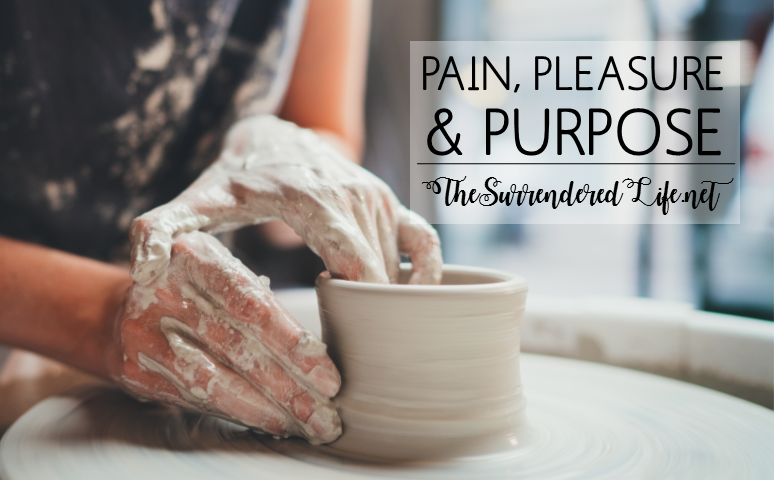|
“Life is pain.” – The Princess Bride We live in a world of instant gratification. We want what we want and we want it now. But there’s a danger in getting comfortable with (and then beginning to expect) quick fixes. Unfortunately, when things aren’t easy or quick, we can be prone toward anger and we can often be guilty of taking our anger out on those around us. Our discouragement and frustration usually end in giving up (failure to overcome our struggles) and giving in (isolating and indulging ourselves to deal with the failure). Our reaction to hardship in life reveals the biggest idol we all struggle with: a pain- and problem-free life. On the surface, this seems like it shouldn’t be an idol. It seems like a good thing. And we certainly don’t want to have a pain- and problem-FILLED life. So what’s the problem here? The problem is that when we fail to surrender this desire for ease and comfort, we can be guilty of making decisions based on whether we believe it will increase our ease and comfort or not, rather than based on God’s goodness, love, and ability to provide for us regardless of our circumstances. When we have a goal of living a pain- and problem-free life, we begin to do whatever it takes to get it – whatever the cost. WHEN PLEASURE RULESSeveral weeks ago I shared with you Brad Bigney’s process of belief, which uses the acronym “TEA” to describe how what we think about shapes our character. Let’s use that formula to consider the dangers here: Stimuli (what happens to me that I cannot control): Since it’s a common struggle, let’s use the idea of physical pain. Perhaps a chronic illness, or maybe an injury of some sort that is just taking too long to recover from. Thoughts (how I respond to my circumstances): What we think about and choose to dwell on reveals a problem: we have a pattern of seeing our circumstances through the lens of ourselves, our understanding, our plan, and our pleasure.
Emotions (how I feel as a result of what I’ve been telling myself): Our emotions flow out of our thoughts. When we have self-centered thoughts, our emotions are negatively affected.
Actions (how I act as a result of how I feel): Our actions are fueled by what we think and how we feel. Our actions are our attempt to regain control and somehow feel better about ourselves and our situation. Since our thoughts are self-centered and our emotions are negative, our behavior is destructive to us and to those around us because we have failed to consider God.
This behavior reinforces our negative thought pattern: Thoughts:
Emotions:
Actions:
This cycle continues and through the process, the person’s character begins to reveal itself. When confronted with physical pain, this person becomes angry, depressed, and indulges in destructive behavior to seek relief. Is taking pain medicine wrong? No. But abusing it is. How did this person get to such an extreme as addiction? By thinking about how their suffering was too much, how their suffering was unfair, and how they shouldn’t have to deal with the pain. Their focus was entirely on themselves. And when our focus is on ourselves, the inevitable result is sin. This may seem extreme, but you know what? Nearly every sin problem we deal with in life stems from this one lie about pain, and because of that, we can put potentially any uncomfortable circumstance in the “stimuli” slot above and find a very similar result. When you lose your job, how do you respond? When you can’t seem to get out of debt, how do you respond? When you lose a loved one, how do you respond? When you can’t get pregnant, how do you respond? When you receive a bad diagnosis, how do you respond? If we’re honest, I think we would all have to admit that regardless of the suffering we’re experiencing (and let’s be real: we are all experiencing some kind of suffering because that is the reality of our world), our default reaction leads us to anger. Sometimes it’s an explosive anger, sometimes it’s a quiet and resentful anger. But the anger that we are experiencing is what fuels our rebellion against our circumstances, our family and friends, and ultimately, God, as we try to deal with our suffering. MY LIFE, MY WAYI’ve heard countless people advise that we should be angry at God. But I would have to disagree with that idea. Rather than encourage you to be angry when you’re in pain, I want to challenge you to surrender your anger and learn to trust God with your pain. Contrary to popular belief, anger does not help. Anger doesn’t remove pain. Anger doesn’t solve your problems. Anger is not healing. Here’s why: Anger is an unwillingness to accept God on His terms. Ultimately, this anger reveals that our goal in life is misplaced. Rather than basing the purpose of our lives in Christ and the Word of God, we have instead set ourselves up to believe that happiness and pleasure are our ultimate goal. So when life is not pleasant and we aren’t experiencing happiness, we feel justified in our frustration and anger, and begin to tell ourselves, “it’s not fair.” THE DANGER OF ANGERWe’ve spent the better part of the last two months discussing the character of God. We talked about His goodness and His love. We talked about how He is in control and how He is trustworthy. But when we get angry, we reveal that deep down inside, we still think we know better. So when God does something we don’t like, we get angry. In times of suffering, we each have a choice to make. Will I believe that God is good? Will I believe that God loves me? Will I believe that He is in control? Will I believe that He is doing what is best for me? When you don’t choose to believe and call to mind these truths, then by default you are believing the opposite. We don’t set out to believe that God is not good, loving, or trustworthy. But when we focus on our pain, we can easily slip into believing those lies and rejecting the truth. The fact that we respond in anger when we don’t get our own way, when we don’t like what God is doing, and when we experience challenges in life, is really just the beginning, because that anger causes us to act out – and that’s where we see the most damage. For some, that anger leads to isolation, self-pity, depression and suicidal thoughts. Others respond by blowing up and literally leaving a wake of damage behind them, taking out their anger on a wall, a car, an object, or even a person. Some people begin to use their problems as an excuse to drink their stress away. And along the same lines, others escalate with drugs to take the pain away. I’ve even talked to some people who have pursued psychiatric medications to control the symptoms of their sin, choosing to believe that they won’t act out because they won’t get angry because of the medications that numb their emotions. Meanwhile, they still believe the same lies and are still in need of a Savior, but are unwilling and unable to respond, because they believe the solution has been found in their medications instead of Jesus. Let’s all be real: life is hard. Life is unfair. We can’t escape it – and we need to stop trying. Even if you find a way to escape it now, there will come a time when you won’t, and it will break you. A NEW PURPOSEThe natural extension of believing that we deserve a pain- and problem-free life is to believe that when we do have trouble in life, it’s God’s job to fix it. Our culture promotes this – false teachers promote this – and even in popular Christian media and churches, we hear this idea. Give your life to Jesus and He’ll make your life better. “I have told you these things, |
bethany HARRISIn a word: passionate. Archives
December 2018
Categories
All
|


